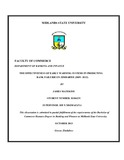Please use this identifier to cite or link to this item:
https://cris.library.msu.ac.zw//handle/11408/226| Title: | The effectiveness of early warning systems in predicting bank failures in Zimbabwe, 2009–2012 | Authors: | Matekwe, James | Keywords: | Warning systems Bank failures Zimbabwe |
Issue Date: | 2013 | Publisher: | Midlands State University | Abstract: | The main purpose of this research was to assess the effectiveness of early warning systems in predicting bank failures in Zimbabwe. This emanated from the problem that the supervisory systems in place were reactive rather than proactive. The lack of forecasting or prediction tools meant that the supervisory tools in place could not detect and avert problems before they materialized in the financial system. The objectives were achieved through the use of a combination of failure prediction models and survey research. Literature revealed that early warning systems are an effective way of identifying potential problem banks timeously; hence they could have assisted in preventing bank failures in Zimbabwe. The findings show that though failure prediction models are significant in predicting incipient financial distress, they are not an end in themselves hence the need to supplement model results with qualitative research. In that regard, the research found that there is need for a holistic approach in the application of models, that is, take due considerations to qualitative variables that cannot be modeled. The survey findings show that the major causes of bank failures were poor corporate governance practices and poor risk management systems. Bank specific factors were found to have a greater impact on bank failure than macroeconomic factors. Results also revealed that the macroeconomic environment also play a role in the safety and soundness of banking institutions, however the impact was found to be minimal compared to bank specific factors. The research revealed that early warning systems such as Z-score model are relevant in Zimbabwean banking sector. Findings indicated that the supervisory systems in Zimbabwe were inadequate in the sense that they were static and reactive. Early warning systems were found to be useful in providing forward looking perspective and also as a proactive mechanism to the supervisory tools. As a result of the findings there is need to develop a failure prediction model based on the CAMELS factors, use of model results in scheduling onsite examinations and aggressively regulate and supervise financial institutions so as to maintain the safety and soundness of the Zimbabwean financial system. | URI: | http://hdl.handle.net/11408/226 |
| Appears in Collections: | Bachelor Of Commerce Banking And Finance Honours Degree |
Files in This Item:
| File | Description | Size | Format | |
|---|---|---|---|---|
| matekwe james.pdf | 54.15 kB | Adobe PDF |  View/Open |
Page view(s)
118
checked on Apr 18, 2025
Download(s)
100
checked on Apr 18, 2025
Google ScholarTM
Check
Items in MSUIR are protected by copyright, with all rights reserved, unless otherwise indicated.



